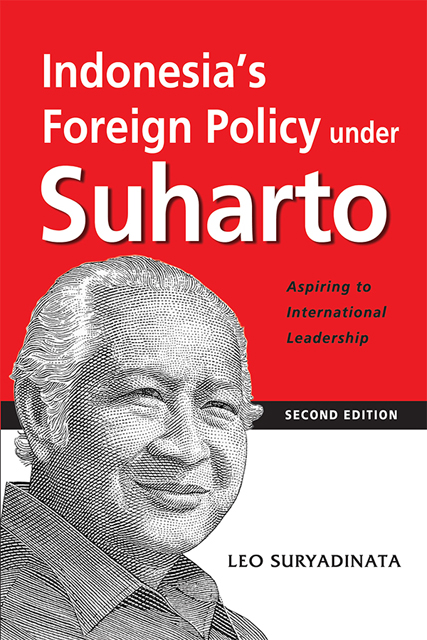Book contents
- Frontmatter
- Contents
- Preface to the Second Edition
- Preface
- Acknowledgements
- Introduction: Suharto’s Foreign Policy
- 1 Determinants of Indonesia’s Foreign Policy: In Search of an Explanation
- 2 Indonesia’s Foreign Policy before the New Order: In Search of a Format
- 3 Indonesia’s Foreign Policy during the “New Order” (I): The Rise of the Military
- 4 Indonesia’s Foreign Policy during the “New Order” (II): The Assertive Role of the President
- 5 Indonesia’s Relations with the ASEAN States: Regional Stability and Leadership Role
- 6 Indonesia’s Relations with Australia and Papua New Guinea: Security and Cultural Issues
- 7 Indonesia-China Relations: Ideology, Ethnic Chinese and the President
- 8 Indonesia-Vietnam Relations and the Kampuchean Issue: The Security Factor
- 9 Indonesia-Superpower Relations: Economic and Non-Economic Factors
- 10 Indonesia, the Middle East and Bosnia: Islam and Foreign Policy
- 11 Indonesia, the Non-Aligned Movement and APEC: In Search of a Leadership Role
- Conclusion: To Lead and Not to Be Led
- Postscript: Indonesia’s Foreign Policy from the Fall of Suharto to Joko Widodo: Still Aspiring to International Leadership?
- Bibliography
- Appendices
- Index
5 - Indonesia’s Relations with the ASEAN States: Regional Stability and Leadership Role
Published online by Cambridge University Press: 01 September 2023
- Frontmatter
- Contents
- Preface to the Second Edition
- Preface
- Acknowledgements
- Introduction: Suharto’s Foreign Policy
- 1 Determinants of Indonesia’s Foreign Policy: In Search of an Explanation
- 2 Indonesia’s Foreign Policy before the New Order: In Search of a Format
- 3 Indonesia’s Foreign Policy during the “New Order” (I): The Rise of the Military
- 4 Indonesia’s Foreign Policy during the “New Order” (II): The Assertive Role of the President
- 5 Indonesia’s Relations with the ASEAN States: Regional Stability and Leadership Role
- 6 Indonesia’s Relations with Australia and Papua New Guinea: Security and Cultural Issues
- 7 Indonesia-China Relations: Ideology, Ethnic Chinese and the President
- 8 Indonesia-Vietnam Relations and the Kampuchean Issue: The Security Factor
- 9 Indonesia-Superpower Relations: Economic and Non-Economic Factors
- 10 Indonesia, the Middle East and Bosnia: Islam and Foreign Policy
- 11 Indonesia, the Non-Aligned Movement and APEC: In Search of a Leadership Role
- Conclusion: To Lead and Not to Be Led
- Postscript: Indonesia’s Foreign Policy from the Fall of Suharto to Joko Widodo: Still Aspiring to International Leadership?
- Bibliography
- Appendices
- Index
Summary
Introduction
In the previous chapter Indonesia’s foreign policy under Suharto has been discussed to show the increasing role of the military and the President himself in the decision-making process. From the early 1980s, Suharto was the major foreign policy-maker. In this chapter, discussion focuses on the rise of the Association of Southeast Asian Nations (ASEAN) and Indonesia’s role in this regional grouping. The role of the military and the President in Indonesia’s bilateral relations with individual ASEAN states (except Vietnam) will also be examined.
The Rise of ASEAN
It has been argued by many Indonesian leaders, at least prior to 1988, that ASEAN is the cornerstone of Indonesia’s foreign policy. In other words, the ASEAN states are crucial to Indonesia’s national interests, that is, its stability and security. It is not surprising, then, that Indonesia was instrumental in establishing this regional organization.
When Suharto came to power in 1966, he immediately ended the confrontation with Malaysia and began to show to the world, especially to the West, that he would abandon the aggressive policy of Sukarno. He was convinced that, with political stability, he would be able to develop Indonesia’s economy through foreign investment and foreign aid. The economy during the Sukarno era was seriously troubled. This partly accounted for the political instability of that time. Economic rehabilitation was perceived by the new leadership as a way to legitimize their new regime. Thus, the major concern of the new elite was to create political stability in the region, particularly among the non-Communist ASEAN states. ASEAN, as a regional organization, would serve this purpose. Only under stable conditions would Indonesia be able to develop economically.
As a matter of fact, ASEAN was not the first regional organization in Southeast Asia. As early as 1955, the Southeast Asian Treaty Organization (SEATO) was established by the United States to combat Communism in the region. But only two (namely, the Philippines and Thailand) out of its eight members were from Southeast Asia. This military pact failed to achieve its goal because the threat posed by Communism took the form of subversive activities and could not be solved through conventional military means. In addition, most of the members were not committed to the goal. Like the Communist states, anti-colonialist Indonesia was hostile towards this organization.
- Type
- Chapter
- Information
- Indonesia's Foreign Policy under SuhartoAspiring to International Leadership, pp. 66 - 90Publisher: ISEAS–Yusof Ishak InstituteFirst published in: 2023

